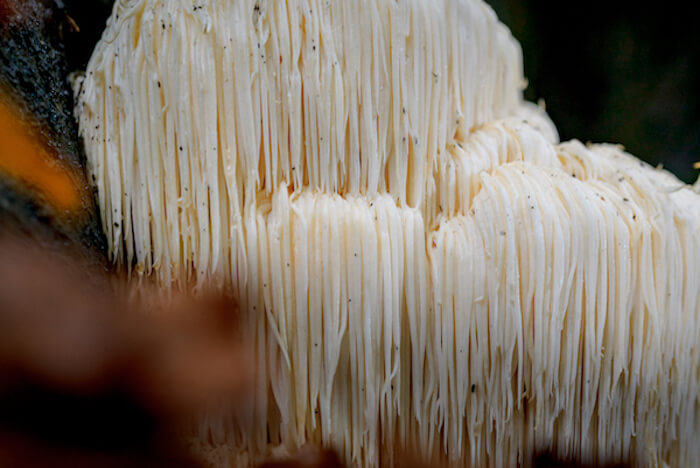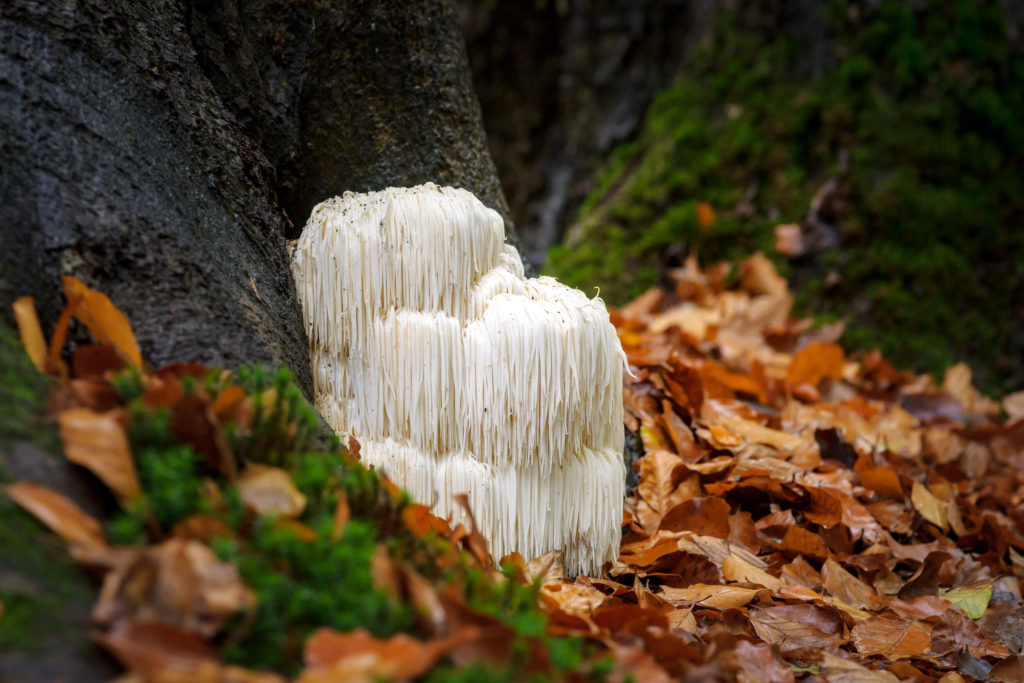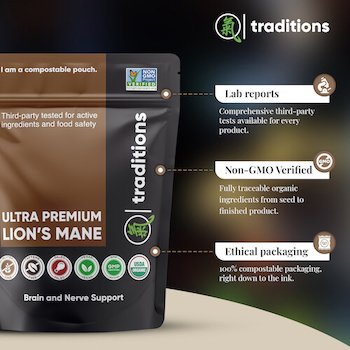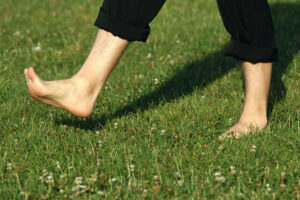Among medicinal mushrooms, Lion’s Mane (Hericium erinaceus, in Latin) is one of the most beautiful: its inspiring cascade of furry-white filaments is the reason for its name. It’s also one of the most beneficial, in terms of its positive effects upon the human body-mind.

Healing Properties Of Lion’s Mane Mushroom
Lion’s Mane has long been employed in Chinese and Japanese medical systems to alleviate stress, resolve digestive issues, and strengthen the immune system. The Chinese name for Lion’s Mane is hóu tóu gū (“monkey-head mushroom”), while in Japan it’s known as yamabushitake (“mountain monk mushroom”).
Other uses —in Asian as well as western cultures—include:
• Reducing inflammation
• Relieving mild symptoms of anxiety and depression
• Decreasing the risk of heart disease
• Healing ulcers
• Managing diabetes symptoms
• Helping to fight cancer
USE CODE PROJWELLNOW TO SAVE EXTRA 10% OFF!
I’m hard to please.
I’m a pioneer with medicinal mushrooms.
Get some in your system you will thank me and yourself.” – Sandy F., Vaudreuil, Quebec
The Neurological Activity Of Lion’s Mane
But it’s the neurological effects of this mushroom that are potentially the most revolutionary. Scientific studies have confirmed the ability of Lion’s Mane to enhance the growth of axons and dendrites: the branching limbs that extend outward from the body of neurons and facilitate communication among brain cells.
According to a research review article published in the Journal of Restorative Medicine (Volume 6:1, December 2017):
“The [Lion’s Mane] mushroom is abundant in bioactive compounds … which potentially have neuroprotective and neuroregenerative properties. Because of its anti-inflammatory properties and promotion of nerve growth factor gene expression and neurite (axon or dendrite) outgrowth, H. erinaceus [Lion’s Mane] mycelium shows great promise for the treatment of Alzheimer’s and Parkinson’s diseases.”
In other words, by helping to increase the healthy growth of neurons (i.e. brain cells), bioactive components within this magnificent mushroom may help to slow or even reverse cell degeneration in the brain—which is the primary characteristic of diseases such as Alzheimer’s and Parkinson’s. To understand a bit more clearly the mechanisms involved in this healing process, let’s explore the anatomy and physiology of neurons.
Axons & Dendrites & Lion’s Mane … Oh My!
As you may recall from your high school biology class, dendrites are the part of the neuron that receives information (in the form of electrical impulses) from other neurons. And axons are the transmitting portion of the neuron: they extend electrical impulses … which are received by the dendrites of neighboring neurons. It’s this neuronal activity—with the axons and dendrites working in concert—that allows our brain and nervous system to receive sensory input from the external world, to send motor commands to our body’s muscles. So it’s really important!
Along with initiating the growth of new axons and dendrites, Lion’s Mane mushroom has also been shown to support the remyelination of axon sheaths. And what exactly is a myelin sheath? It’s the insulating covering of the axon, that increases the speed at which electrical impulses can travel within the nervous system. So healthy myelin sheaths = an efficiently functioning brain and peripheral nervous system.
It’s for these reasons that Hericium erinaceus can be used to protect against and heal dementia, Alzheimer’s, Parkinson’s, and other neurodegenerative diseases. It can also be used to treat the effects of stroke; speed recovery from peripheral nerve injuries; and to improve overall cognitive function (i.e. memory, intelligence, and creativity).
Lion’s Mane Mushroom: Cautions & Side Effects
Lion’s Mane appears to be extremely safe. No major side effects that have been observed from the consumption of this mushroom, or its extract.
That said, if you are allergic to mushrooms, you should, of course, be cautious. There have been some documented cases of people experiencing difficulty breathing or mild skin rashes after exposure to lion’s mane mushrooms—symptoms that are likely related to allergies.
The Bottom Line
Supplementing with Lion’s Mane mushroom can be a wonderfully effective way of supporting the long-term health of your brain and nervous system. Host Defense/Fungi Perfecti offers some excellent Lion’s Mane extract and capsules—to get you started.
To your health and happiness!
YOU MAY ALSO LIKE:
HOW GROUNDING KEEPS US HEALTHY AND GROWS OUR JOY
Remember running around the yard barefoot on the grass as a kid, feeling the warm earth beneath your toes? As it…
YOUR SKINCARE SUPER-HERO: THE MYRIAD BENEFITS OF ALOE VERA
THE SKIN: OUR LARGEST ORGAN Did you know that the skin is our largest organ? It’s true! And because it’s our…
THE IMPORTANCE OF OFF DAYS IN YOUR WORKOUT WEEK
By Kevin Jones Personally, I found it tough to take rest days for a long time. I’m a runner, and I…
HOW TO COMBINE YOGA AND RUNNING IN YOUR WORKOUT ROUTINE
By Kevin Jones Many runners want to make yoga into a regular habit but aren’t sure where to start. On the…
HOLY BASIL HEALTH BENEFITS
Holy basil, also known in some circles as tulsi (you will learn why in a moment), is gaining in popularity as…
USES AND BENEFITS OF COCONUT OIL
Today, over 80 countries (including Mexico, Ghana, India, Ivory Coast, and Fuji) grow more than 150 varieties of coconuts. The number…











